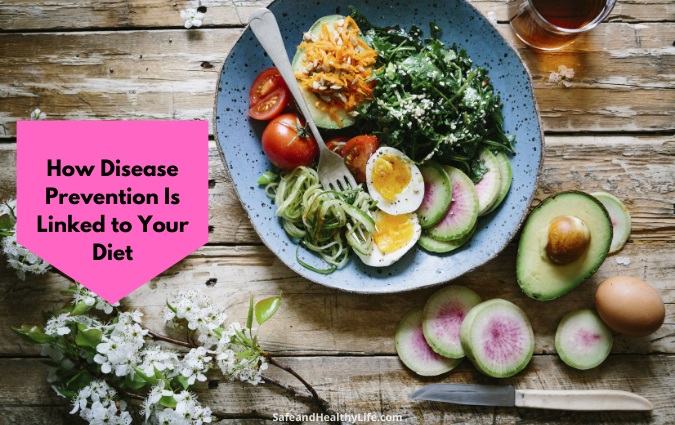
Research shows that ingesting too much or too little of certain types of food and nutrients can increase your chances of contracting chronic diseases, among them being type 2 diabetes, stroke, cancer, and heart disease.
In retrospect, certain nutrients can help in the prevention of these illnesses, especially the ones that have been dubbed ‘lifestyle diseases’.

Photo by Louis Hansel @shotsoflouis on Unsplash
Food and nutrition, therefore, play a pivotal role in the promotion of good health and the prevention of diseases. Over 75% of our healthcare costs go towards treating these illnesses. By eating better and exercising more we can help lessen this burden on our society.
A Good Diet Keeps Your Body Weight in Check
And a healthy body weight works hand-in-hand with disease prevention.
Excess body weight is the single most common cause of health complications. It is particularly a promoter of type 2 diabetes. Obesity makes you about 20 to 40 times more likely to develop diabetic complications compared to someone with a normal weight.
One of the leading causes of increased body weight is eating junk food. These foods taste incredibly good. Hard as they are to resist, they will get you hooked and keep your mouth munching. (like those McDonald’s craving trips some of us are guilty of)
You can manage your weight by choosing to eat healthily. Take a balanced diet consisting of whole foods and avoid overeating. One major way of watching your weight is by utilizing proper portion control.
This will keep you eating what is enough for your body. When you overeat, the food will eventually be converted into excess fats and stored in your body tissues. Get amazing portion control tips here.
The Disease-Prevention Capabilities of Organic Foods
From a nutritional point of view, organic foods have more nutrients compared to their non-organic counterparts.
Study shows that organic milk contains about 62% more omega-3 fatty acids and 25% less omega 6 fatty acids compared to conventional milk.
This means that the ratio of omega 3 to omega 6 fatty acids is much better, hence reducing the risk of inflammation to the body when consumed.
Long-term intake of pesticides and herbicides such as those used in conventional farming is one of the leading causes of neurodegenerative diseases, cancer, endocrinological diseases, and rheumatic diseases.
Such diseases can be prevented by eating organic foods. Organic farming avoids the use of pesticide and herbicide applications.
Apart from taking nutrient-dense foods, it is imperative that you take foods that are toxin-free, and this can only be achieved by adopting an organic diet.

Keep Toxins Away from Your Body
Some of the toxins that find their way into our bodies can bring about many health complications as shown above.
Detoxification is an essential part of maintaining optimal health. A healthy diet is the most important way to remove toxins from your body.
Some of the foods that can help detoxify your body include natural fats and oils such as organic coconut oil and extra virgin olive oil. They provide energy for the detox process.
Nuts and seeds contain fiber that is important in protein excretion and elimination from the body. Examples are sunflower seeds, almonds, and flax seeds.
A Good Diet Keeps Your Heart Healthy
A high intake of saturated and trans fats increases your blood cholesterol level and increases the risk of coronary artery disease.
A high cholesterol level in the blood may lead to the accumulation of plaques in your blood, a situation called atherosclerosis. Atherosclerosis can increase the risk of stroke and heart attack.
The recommended amount of saturated fats is less than 6% of the total daily calories you take.
To keep your heart healthy, you need to take low-fat proteins. Low-fat protein options include skim milk as opposed to whole milk.
Take low-fat dairy products, eggs, and lean poultry, meat, and fish. There are some types of fish that are rich in omega-3 fatty acids which lower triglyceride levels in the blood. This makes for a healthier heart. Such fish include salmon and herring.
Legumes are also healthy sources of low-fat proteins. Another advantage of including them in your meals is that they are cholesterol-free.
Examples include lentils and beans. Taking these plant proteins instead of animal proteins will reduce the levels of fat and cholesterol in your body. It will also increase your fiber intake.

Photo by Jamie Street on Unsplash
Why A Good Exercise Routine Helps Strengthen Your Diet
Exercise is the other half of the battle for a healthy lifestyle. After conquering your dietary concerns, it’s time to start exercising more regularly and making it a common part of your life.
Overall, exercising is not hard, and there are many forms to choose from that fit your lifestyle.
This includes bike riding, jogging, pilates, and yoga. You can also head to the gym and lift some weights. Remember to start off slow and build yourself up to larger weight limits.
Over 50% of Americans fail to regularly exercise which is a leading cause of obesity. Exercising regularly can help you lose or manage your weight especially when paired with a healthy diet. Exercise is inherently linked to the prevention of many diseases and also helps with mental health issues.
We need to strengthen ourselves to provide better examples for our children and families. Eat healthily, get out and exercise, because a fit version of you will be a much happier and healthier version of yourself.
Remember, a doctor can’t prescribe your medication to magically make you fit. This all on you to make better choices and find different options to help you lose weight, get fit, and avoid diseases like diabetes.
Conclusion
A healthy and well-balanced diet that contains all essential nutrients can be a superb way of preventing diseases from striking.
It can help control your body weight and avoid massive health complications like heart disease and diabetes.
A good diet consisting of organically grown foods can control the level of toxins in your body. You can also maintain a healthy heart just by the kind of diet you choose.
Avoid high cholesterol intake by reducing your intake of saturated fats. Instead, take low-fat proteins such as legumes.
If you take a keen interest in what you eat and choose only healthy options, you will be amazed at how healthier you will feel. Pair this with consistent exercise and you’ll be fit and healthy in no time.
About The Author:
 Sarah McColman is a proud writer for Community Natural Foods in Calgary, Alberta. She loves bringing awareness to how people can improve their health and wellness through quality food.
Sarah McColman is a proud writer for Community Natural Foods in Calgary, Alberta. She loves bringing awareness to how people can improve their health and wellness through quality food.




